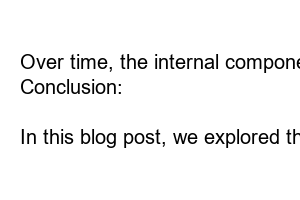냉장고 소음 원인
Title: Causes of Refrigerator Noise: Identifying the Culprits Behind the Clatter
Introduction:
A refrigerator is an indispensable appliance in every household, ensuring the freshness and longevity of our food and beverages. However, when that familiar hum transforms into an unwelcome noise, it can become a cause of concern. In this blog post, we will delve into the various causes of refrigerator noise and provide valuable insights to help you identify and address them.
Subheading 1: Bent or Misaligned Condenser Fan Blades
When the condenser fan blades become bent or misaligned, they can generate a buzzing or clicking noise, disrupting the tranquil environment of your kitchen. Regularly check your condenser fan blades to ensure they are functioning optimally and make any necessary adjustments.
Subheading 2: Vibrating Components
Refrigerators contain multiple components that can vibrate, leading to irritating noises. These components include the compressor, condenser coils, and various pipes. Securely fasten loose parts with appropriate tools and consider using vibration dampening pads to minimize noise.
Subheading 3: Faulty Evaporator Fan Motor
A malfunctioning evaporator fan motor can produce high-pitched or screeching sounds. The evaporator fan is responsible for circulating cool air within the refrigerator, so a faulty motor can impede its performance and disrupt the peaceful ambiance of your home. To rectify this issue, contact a professional technician for repairs or replacement.
Subheading 4: Clogged or Faulty Defrost Heater
A clogged or defective defrost heater can result in unusual noises emanating from the freezer compartment. The defrost heater is responsible for melting ice build-up, but when it malfunctions, it can create clicking or sizzling sounds. Regularly clean the defrost heater and seek professional assistance if the problem persists.
Subheading 5: Damaged Compressor
The compressor is often referred to as the “heart” of the refrigerator. If it sustains damage, it can emit loud banging, clattering, or screeching noises. Unfortunately, a damaged compressor requires immediate attention from a professional technician, as repairing or replacing this crucial component requires expertise.
Subheading 6: Improper Alignment or Aging of Internal Parts
Over time, the internal components of a refrigerator can become misaligned or worn, leading to unusual sounds. Check if the shelves, drawers, or racks are properly aligned, and if necessary, readjust them. Aging parts may require professional maintenance or replacement.
Conclusion:
Understanding the causes of refrigerator noise is essential in maintaining a peaceful and functional kitchen space. By promptly addressing bent fan blades, vibrating components, faulty fan motors, clogged defrost heaters, damaged compressors, and aging parts, you can minimize disruptions and enjoy a quieter refrigerator. Remember to seek professional assistance when necessary to ensure proper repairs and maintenance.
Summary:
In this blog post, we explored the various causes of refrigerator noise, including bent fan blades, vibrating components, faulty fan motors, clogged defrost heaters, damaged compressors, and aging parts. By understanding and addressing these issues, you can restore the tranquility of your kitchen and ensure the longevity of your refrigerator. Remember to seek professional assistance when required for complex repairs.

